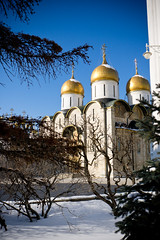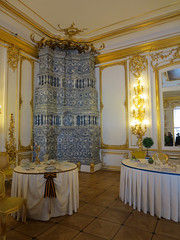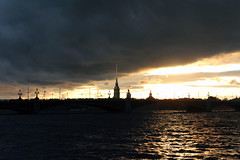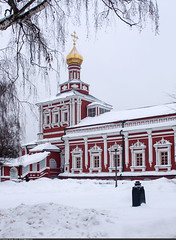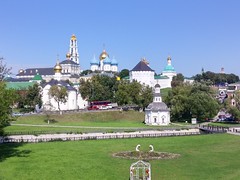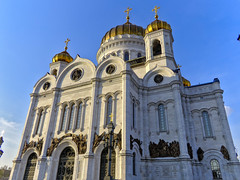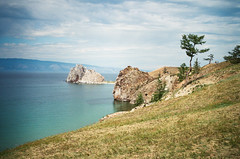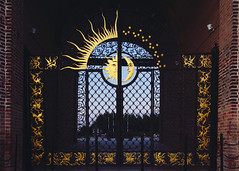 Russia
Russia
Russia , or the Russian Federation,efn|Russian: Российская Федерация}} is a transcontinental country spanning Eastern Europe and Northern Asia. It is the largest country in the world, encompassing one-eighth of Earth's inhabitable landmass. Russia extends across eleven time zones and shares land boundaries with fourteen countries. It is the world's ninth-most populous country and Europe's most populous country. The country's capital and largest city is Moscow. Saint Petersburg is Russia's cultural centre and second-largest city. Other major urban areas include Novosibirsk, Yekaterinburg, Nizhny Novgorod, and Kazan.
The East Slavs emerged as a recognisable group in Europe between the 3rd and 8th centuries CE. The first East Slavic state, Kievan Rus', arose in the 9th century, and in 988, it adopted Orthodox Christianity from the Byzantine Empire. Rus' ultimately disintegrated, with the Grand Duchy of Moscow growing to become the Tsardom of Russia. By the early 18th century, Russia had vastly expanded through conquest, annexation, and the efforts of Russian explorers, developing into the Russian Empire, which remains the third-largest empire in history. However, with the Russian Revolution in 1917, Russia's monarchic rule was abolished and eventually replaced by the Russian SFSR—the world's first constitutionally socialist state. Following the Russian Civil War, the Russian SFSR established the Soviet Union with three other Soviet republics, within which it was the largest and principal constituent. At the expense of millions of lives, the Soviet Union underwent rapid industrialisation in the 1930s, and later played a decisive role for the Allies of World War II by leading large-scale efforts on the Eastern Front. With the onset of the Cold War, it competed with the United States for global ideological influence; the Soviet era of the 20th century saw some of the most significant Russian technological achievements, including the first human-made satellite and the first human expedition into outer space.
In 1991, the Russian SFSR emerged from the dissolution of the Soviet Union as the independent Russian Federation. A new constitution was adopted, which established a federal semi-presidential system. Since the turn of the century, Russia's political system has been dominated by Vladimir Putin, under whom the country has experienced democratic backsliding and a shift towards authoritarianism. Russia has been involved militarily in a number of post-Soviet conflicts, which has included the internationally unrecognised annexations of Crimea in 2014 from neighbouring Ukraine, followed by the further annexation of four other regions in 2022 during an ongoing invasion. International rankings of Russia place it low in measurements of human rights and freedom of the press; the country also has high levels of perceived corruption.
The Russian economy ranks 67thby nominal GDP per capita globally and ranks among the largest in the world, relying chiefly upon its abundant natural resources. Its mineral and energy sources are the world's largest, and its figures for oil production and natural gas production rank high globally. Russia possesses the largest stockpile of nuclear weapons, and has the fifth-highest military expenditure. The country is a permanent member of the United Nations Security Council; a member state of the G20, the SCO, BRICS, the APEC, the OSCE, and the WTO; and is the leading member state of the CIS, the CSTO, and the EAEU. Russia is home to 30 UNESCO World Heritage Sites.
Etymology
The name Russia comes from a Medieval Latin name for Rus', a medieval state populated primarily by the East Slavs. In modern historiography, this state is usually denoted as Kievan Rus' after its capital city. The name Rus itself comes from the early medieval Rus' people, who were originally a group of Norse merchants and warriors who relocated from across the Baltic Sea and first settled in the northern region of Novgorod, and later founded a state centred on Kiev. Another Medieval Latin name for Rus' was Ruthenia.
In Russian, the current name of the country, , comes from the Byzantine Greek name for Rus', . A new form of the name Rus, , was borrowed from the Greek term and first attested in 1387, before coming into official use by the 15th century, though the country was still often referred to by its inhabitants as Rus or the Russian land until the end of the 17th century. There are two words in Russian which translate to "Russians" in English , which refers to ethnic Russians, and , which refers to Russian citizens, regardless of ethnicity.
History
Early history
The first human settlement on Russia dates back to the Oldowan period in the early Lower Paleolithic. About 2 million years ago, representatives of Homo erectus migrated to the Taman Peninsula in southern Russia. Flint tools, some 1.5 million years old, have been discovered in the North Caucasus. Radiocarbon dated specimens from Denisova Cave in the Altai Mountains estimate the oldest Denisovan specimen lived 195–122,700 years ago. Fossils of Denny, an archaic human hybrid that was half Neanderthal and half Denisovan, and lived some 90,000 years ago, was also found within the latter cave. Russia was home to some of the last surviving Neanderthals, from about 45,000 years ago, found in Mezmaiskaya cave.
The first trace of an early modern human in Russia dates back to 45,000 years, in Western Siberia. The discovery of high concentration cultural remains of anatomically modern humans, from at least 40,000 years ago, was found at Kostyonki–Borshchyovo, and at Sungir, dating back to 34,600 years ago—both in western Russia. Humans reached Arctic Russia at least 40,000 years ago, in Mamontovaya Kurya. Ancient North Eurasian populations from Siberia genetically similar to Mal'ta–Buret' culture and Afontova Gora were an important genetic contributor to Ancient Native Americans and Eastern Hunter-Gatherers.
The Kurgan hypothesis places the Volga-Dnieper region of southern Russia and Ukraine as the urheimat of the Proto-Indo-Europeans. Early Indo-European migrations from the Pontic–Caspian steppe of Ukraine and Russia spread Yamnaya ancestry and Indo-European languages across large parts of Eurasia. Nomadic pastoralism developed in the Pontic–Caspian steppe beginning in the Chalcolithic. Remnants of these steppe civilizations were discovered in places such as Ipatovo, Sintashta, Arkaim, and Pazyryk, which bear the earliest known traces of horses in warfare. The genetic makeup of speakers of the Uralic language family in northern Europe was shaped by migration from Siberia that began at least 3,500 years ago. In classical antiquity, the Pontic-Caspian Steppe was known as Scythia. In late 8th century BCE, Ancient Greek traders brought classical civilization to the trade emporiums in Tanais and Phanagoria.
In the 3rd to 4th centuries CE, the Gothic kingdom of Oium existed in southern Russia, which was later overrun by Huns. Between the 3rd and 6th centuries CE, the Bosporan Kingdom, which was a Hellenistic polity that succeeded the Greek colonies, was also overwhelmed by nomadic invasions led by warlike tribes such as the Huns and Eurasian Avars. The Khazars, who were of Turkic origin, ruled the steppes between the Caucasus in the south, to the east past the Volga river basin, and west as far as Kyiv on the Dnieper river until the 10th century. After them came the Pechenegs who created a large confederacy, which was subsequently taken over by the Cumans and the Kipchaks.
The ancestors of Russians are among the Slavic tribes that separated from the Proto-Indo-Europeans, who appeared in the northeastern part of Europe years ago. The East Slavs gradually settled western Russia in two waves: one moving from Kiev towards present-day Suzdal and Murom and another from Polotsk towards Novgorod and Rostov. From the 7th century onwards, the East Slavs constituted the bulk of the population in western Russia, and slowly but peacefully assimilated the native Finnic peoples.
Kievan Rus'
The establishment of the first East Slavic states in the 9th century coincided with the arrival of Varangians, the Vikings who ventured along the waterways extending from the eastern Baltic to the Black and Caspian Seas. According to the Primary Chronicle, a Varangian from the Rus' people, named Rurik, was elected ruler of Novgorod in 862. In 882, his successor Oleg ventured south and conquered Kiev, which had been previously paying tribute to the Khazars. Rurik's son Igor and Igor's son Sviatoslav subsequently subdued all local East Slavic tribes to Kievan rule, destroyed the Khazar Khaganate, and launched several military expeditions to Byzantium and Persia.
In the 10th to 11th centuries, Kievan Rus' became one of the largest and most prosperous states in Europe. The reigns of Vladimir the Great (980–1015) and his son Yaroslav the Wise (1019–1054) constitute the Golden Age of Kiev, which saw the acceptance of Orthodox Christianity from Byzantium, and the creation of the first East Slavic written legal code, the Russkaya Pravda. The age of feudalism and decentralisation had come, marked by constant in-fighting between members of the Rurik dynasty that ruled Kievan Rus' collectively. Kiev's dominance waned, to the benefit of Vladimir-Suzdal in the north-east, the Novgorod Republic in the north, and Galicia-Volhynia in the south-west. By the 12th century, Kiev lost its pre-eminence and Kievan Rus' had fragmented into different principalities. Prince Andrey Bogolyubsky sacked Kiev in 1169 and made Vladimir his base, leading to political power being shifted to the north-east.
Led by Prince Alexander Nevsky, Novgorodians repelled the invading Swedes in the Battle of the Neva in 1240, as well as the Germanic crusaders in the Battle on the Ice in 1242.
Kievan Rus' finally fell to the Mongol invasion of 1237–1240, which resulted in the sacking of Kiev and other cities, as well as the death of a major part of the…
Looking for places related to Russia?
Those are other destinations to find places related to Russia:

